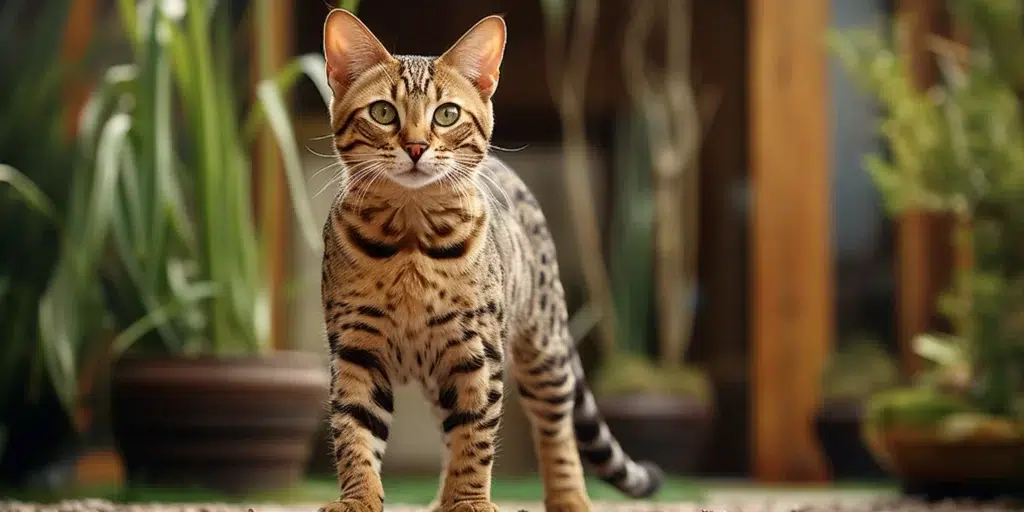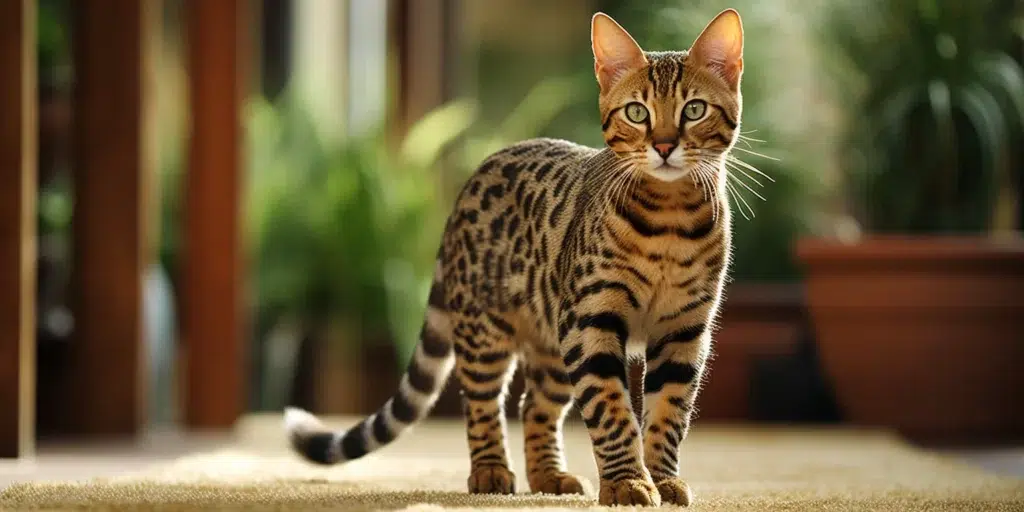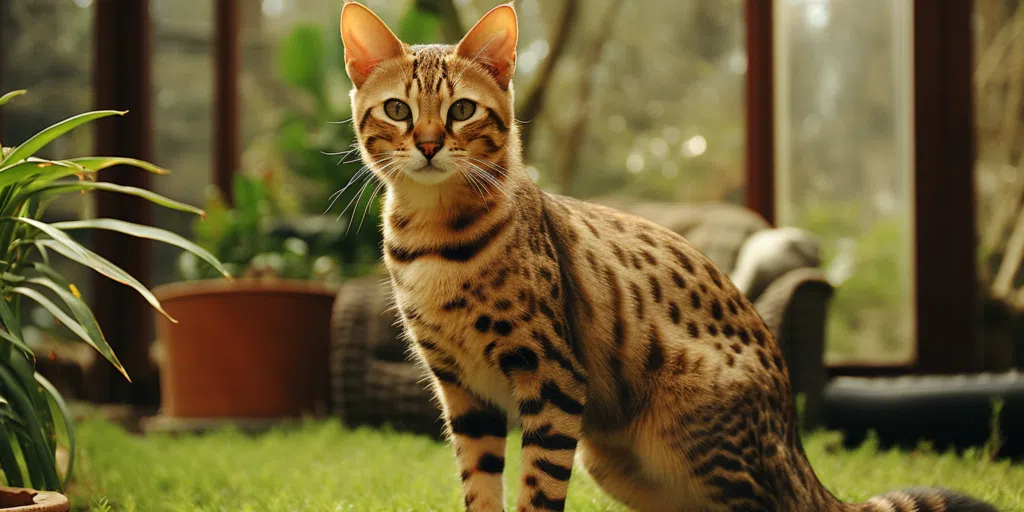The Savannah Cat is a domesticated breed of cat that is strikingly similar to its wild ancestor, the African Serval, but smaller and with more striking markings, such as dark spots and other bold patterns.
These cats are as stunning to look at as they are to behave, and they are known to be very affectionate and loving pets.
With the proper information and care, you can ensure that your Savannah lives a long and healthy life full of love and delight! So let us get started!
Breed Overview

The Savannah cat is a unique and unusual F1 hybrid cross of the African Serval and the domestic housecat. The first known Savannah was produced in 1986 as a consequence of mating an African Serval with a domestic female cat.
This resulted in an exotic-looking breed that rapidly grabbed the attention of individuals with an interest in cats. When Patrick Kelly heard about this new breed and desired to develop it further, he persuaded breeder Joyce Sroufe to help him in his attempt.
This beautiful breed is characterized by its wild appearance—long legs, large ears, short muzzle, and tall stature—as well as its friendly personality. They are highly social cats who love attention from their owners; many owners even compare them to dogs because of their loving nature!
Despite having similarities with wild servals, they have been selectively bred over time so that they can be safely kept indoors without any issues related to behavior or temperament.
Related: 15 American Cat Breeds That Define the U.S. Feline Fancy
Identifying Savannah Cat
The Savannah cat is easily recognizable with its unique features. From the large, tall ears set right on top of its head to the hooded eyes that are flat across the top, this breed stands out amongst other cats.
The Savannah is characterized by a long body and even longer legs, giving the impression of a heavier or larger cat than it actually is. Other distinguishing features include a thick tail and an exceptionally long neck.
This breed of cat is well-known for its distinct exotic appearance when it comes to body patterns, which is a result of its distinctive dark spots on the fur in tones ranging from brown to black.
However, some cats may have stripes or swirls instead of spots, or even a combination of the two, which makes each cat unique.
Savannah Cats have captivating yellow or greenish-gold eyes and distinctive facial features that set them apart from other cat breeds. Additionally, their longer legs complement their slender frame.

Their colors can vary from light tan to deep black, with many variations in between. The markings may also differ depending on the generation you choose. The higher generations, such as F1 through F5, have a greater percentage of serval ancestry.
If you are looking for a cat with a little more flair, the unusual marble pattern is also an option! Whichever color variation you go with, your Savannah cat is sure to turn heads.
Their appearance is not the only thing that sets them apart; their personalities are more energetic than the average domestic cat, and they have a mix of smart curiosity and playful mischief that can keep people entertained for years.
Personality Traits
Savannah cats are sociable cats with a penchant for being around people. When you return home, they will be overjoyed to see you, and they will go out of their way to seek out human companionship and form strong bonds with their caregivers.
Savanna cats are also quite curious, which means that if anything captures their eye or interest, they will study it extensively and fearlessly, sometimes getting into areas or situations that their owner would rather keep them out of!
They may even surprise you by following you on a leash on walks outside! However, because of their playful attitude, it is vital to keep them away from other animals and crowded areas when you go on a stroll with your Savannah.
This breed is big and energetic that it can easily knock over fragile household items, so it is important to keep them out of the house even when they are playing.
The Savannah gets along best with other dogs of a similar temperament or energy level, including Abyssinians, Siamese, or Maine Coons. You can also keep them with Ragdolls or domestic cats who are calm and just watch the Savannah swing from chandeliers.
Dogs and Savannahs can make wonderful friends if brought up together, but only if owners go with caution and keep an eye on both animals until they are both comfortable.
You should not keep this kind of cat with other little animals, like birds, reptiles, or pocket pets, because of their hunting instincts.
Activity Level
Savannahs are incredibly energetic felines that thrive on mental and physical engagement to keep them entertained. They thoroughly enjoy engaging with interactive toys, solving puzzle toys, and discovering treats hidden in various spots throughout the house.
Some cats also love learning tricks and going for walks outside on a leash. To make them happy, it is a good idea to give them cat trees and window perches, so they can climb up high and see the world from a new angle.
To keep Savannahs occupied when you are out of the house, families who work long hours might think about obtaining a cat-friendly dog or another cat.

Savannah Cat Loyalty
Savannah cats are known for their unwavering loyalty to their owners and their ability to form deep connections in no time. They are the perfect lifelong companions, always there to support you, even if they may be a bit cautious around unfamiliar faces.
It is really important to make sure your Savannah cat gets plenty of socialization from a young age. This will help them feel comfortable around people and other animals. Plus, it will prevent them from becoming too territorial as they grow older.
Love Of Water
It is no wonder that many Savannah cats are highly curious and active creatures. They have a knack for being drawn to water, whether it is taking a dip in a pool or joining their owners for some shower time. While some may need a little time to warm up to the idea, most Savannah cats end up loving the sensation of being in water.
In addition, it is worth mentioning that some Savannahs have a playful side when it comes to water. They enjoy interacting with it, and it is not uncommon to see them playing with the water in their bowl.
This unique trait makes them great feline companions, especially for those who enjoy spending time around pools.
Trainability
Savannah cats are incredibly intelligent and social creatures, which makes them a joy to train. Their innate curiosity and playful nature make them enthusiastic learners. With a little patience and consistent training, owners can teach their Savannahs a wide range of tricks, from walking on a leash to giving high-fives.
Your Savannah cat has the potential to become an obedient and loyal companion with the right training. They can be independent by nature, but with your guidance, they will love spending time with you.
It is important for Savannahs to socialize as well. Due to their unique appearance, they might be more cautious when meeting new people.
To encourage positive interactions you should introduce your kitten early on in life to different settings such as family members’ homes or pet stores. This is so that it can get used to different sights and sounds without fear or anxiety getting in the way.
Taking your kitten for walks on a leash on a regular basis will also allow it to explore the outdoors, which will help it develop a better personality and be more receptive to training.
Adult Size
Female Savannah cats tend to be smaller and more delicate than males, and their tall and lean bodies give the impression that they weigh more than they actually do. This medium-to-large cat is noted for its striking appearance.
At maturity, a Savannah cat can be anywhere from 9 to 17 inches tall and, on average, weigh between 8 and 20 pounds. They have a lengthy body that can grow to about 20 to 24 inches. The weight of an adult Savannah cat is depending on gender.

Although these cats may look intimidating due to their large size, they are very gentle and enjoy human interaction just like any other breed of domestic cat would!
The growth rate of the Savannah Cat is one of a kind; initially, the cat develops at a tremendous rate, reaching full size in as little as six months. However, after reaching full height, the growth rate of a Savannah Cat slows down considerably, and from that point on, it will only grow about one inch each year.
Its weight may go up a little as it gets older from muscle growth, but its overall size should not change much. Because of its moderate growth rate, owners can enjoy their cat’s company for a longer period of time than with many other cat breeds because it stays at a manageable size all the way through its life.
Life Expectancy
Savannah cats have a life expectancy of 12 to 15 years. To make sure your Savannah cat reaches its full potential, you should feed them a high-quality diet that is rich in protein.
It is important to make sure your furry companion gets plenty of exercise and mental stimulation. Do not forget to schedule regular checkups with the vet to keep your cat healthy and happy.
You can also help promote a long life for your Savannah by creating an environment that is both stimulating and safe. Providing interactive toys like scratching posts helps keep their minds sharp while providing designated areas where they can explore safely.
Finally, making sure all vaccinations are up-to-date will help protect them against any potentially deadly illnesses or diseases that could shorten their lifespan.
Savannah Cat Care
Savannah cats are exotic and beautiful felines that require a lot of care and attention to stay healthy. A Savannah should be brushed at least once or twice a week with a brush designed for short to medium-length coats.
Daily dental hygiene is best for your cat’s teeth, but if you can’t do it every day, then weekly brushing is better than nothing. You can also get them chewing toys to help with their dental hygiene.
When it comes to exercise, Savannah cats can benefit from having access to an outdoor enclosure or being kept as indoor-only pets. Additionally, keeping them indoors will help prevent theft of your distinctive and lovely cat as well as potential attacks by other animals or car collisions.
Overall, caring for a Savannah cat requires dedication and commitment, but the results are worth it! With regular grooming sessions, dental hygiene, and access to an outdoor enclosure, you’ll have one happy and healthy kitty on your hands!
Diet
The Savannahs are a breed that loves to stay active, so it is important to provide them with a high-quality diet that meets all their nutritional needs. Make sure each meal is well-balanced, with the right amounts of protein, fat, and carbohydrates to keep them energized.
Dry kibble should make up the majority of their diet and can be supplemented with wet food or treats as rewards during training or playtime.
Choosing the right food for your pet is really important. Kittens have different nutritional needs compared to adults, so it is crucial to select age-appropriate foods. Kittens actually need more calories than adults and may need to be fed multiple times a day until they reach adulthood at around 1-2 years old.

During growth phases, it is important to increase the calorie content in your cat’s food. For example, when transitioning from kitten to adult formulas, you want to make sure your Savannah is getting all the necessary nutrients.
To achieve this, it is a good idea to choose premium brands that use real meat sources. These brands provide the essential nutrients and amino acids that are crucial for healthy development and a strong immune system.
It is important to keep an eye on your Savannah’s weight and regularly monitor it. If you happen to notice a sudden change in their body condition, it could be a sign that they are eating too many calories. In that case, you can adjust their portion sizes accordingly.
It is necessary to refrain from giving any human foods unless your veterinarian specifically approves them. Certain ingredients can upset their digestive system, leading to uncomfortable gastrointestinal issues like vomiting or diarrhea in some cases.
It is important to make sure your furry friend has access to plenty of fresh, clean water to stay healthy and hydrated. To help them stay hydrated, it is a good idea to place their water bowl at least three feet away from their food.
Using a filtered drinking fountain can be a great solution to reduce the strong food odor and ensure that your cat stays hydrated. Cats are naturally attracted to running water, so a fountain can help encourage your Savannah Cat to drink more frequently.
The fountain also offers water that is fresh-tasting and aerated, which some people find even more delicious than regular tap or bottled water.
Exercise Requirement
Savannah cats are known for their high energy levels and need plenty of physical and mental stimulation to prevent boredom. Without proper stimulation, savannahs may exhibit destructive behavior.
To ensure your Savannah stays entertained and engaged, it is crucial to offer ample playtime and exercise options. Consider incorporating interactive toys like puzzle feeders or engaging in a game of chase with a laser pointer.
Spending time with your savannah by playing with or grooming them helps build strong bonds and prevents boredom-related behaviors like scratching furniture.
Shedding Levels
Savannah kittens shed more than adult cats do for a number of reasons, including the fact that their coats are still developing and may be going through some color and texture changes.
Grooming your cat on a regular basis is vital at all life stages to keep its coat healthy and prevent shedding. This will also reduce the allergens in your home if you have allergy to savannah cats.
Savannah cats’ shedding, however, may significantly increase as they enter their senior years. This is due to changes in their coats brought on by hormonal imbalances or medical issues.
Regular brushing will help remove excess fur before it gets a chance to settle on furniture or clothing. It also gives you time to bond with your cat and check for any potential skin issues that may need addressing by a vet.
Health Issues
Savannahs are generally considered to be healthy cats; however, they are susceptible to some genetic conditions and infectious diseases.
The most common diseases for this breed include:
- Pyruvate Kinase Deficiency
- Progressive Retinal Atrophy
- Hypertrophic Cardiomyopathy (HCM)
- and various infectious agents
It is recommended that Savannahs receive health screenings for these conditions to ensure they remain in good health.
Keep in mind that they can develop several health issues due to poor diet and living conditions. Poor ventilation and cleanliness can also cause respiratory infections and other ailments.
Regular veterinary visits are also vital for preserving your Savannah cat’s overall health, and a nutritionally balanced diet including high-quality proteins, fats, carbs, vitamins, and minerals will help avoid diseases.
Buying Tips
- Research the breeder: Before purchasing a Savannah cat, make sure to research the breeder and ask questions about their cats’ health, vaccinations, and socialization.
- Look for healthy kittens: When buying a Savannah Cat, look for signs of good health in the kitten, such as bright eyes, a shiny coat, and active behavior. Make sure that the kitten is up-to-date on all vaccinations before taking it home.
- Consider temperament: The temperament of your new cat is an important factor when buying a Savannah cat, as they can be quite active and require plenty of playtime with their owners to stay happy and healthy!
- Knowing what you’re getting into Owning any pet requires commitment and responsibility; this includes providing food, water, shelter, regular vet visits, vaccinations, etc., so make sure you are prepared for these responsibilities before deciding to purchase one!
Related: Amazing Savannah Cat Names & How To Select One!

Conclusion
Savannah cats are unique and captivating cats that can make wonderful companions. They have a wild beauty, with their exotic looks and interesting personalities. In addition to being beautiful, they are loyal and affectionate pets that provide endless love and entertainment.
They require patience, understanding, and commitment from their owners to thrive. If you can offer them the care they need in return for their loyalty, then a Savannah may be the perfect pet for you!